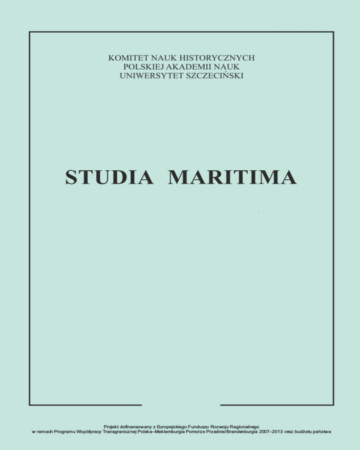






| Authors: |
Piotr
Szlanta
Instytut Historyczny, Uniwersytet Warszawski |
| Keywords: | William II Alfred von Tirpitz Germany Great Britain fleet naval arms race First World War |
| Data publikacji całości: | 2017 |
| Page range: | 27 (41-67) |
| 1. | Bethman Hollweg, Theobald von. Betrachtungen zum Weltkriege, t. I. Berlin: Hobbing, 1919. |
| 2. | British Documents on the Origins of the War 1898–1914, red. George P. Gooch, Harold Temperley, t. I–XI. London: His Majesty’s Stationery Office, 1927–1938. |
| 3. | Bülow, Bernhard von. Denkwürdigkeiten, t. I–IV. Berlin: Ullstein, 1930. |
| 4. | Canis, Konrad. Der Weg in den Abgrund. Deutsche Außenpolitik 1902–1914. Paderborn: Schöningh, 2011. |
| 5. | Canis, Konrad. Von Bismarck zur Weltpolitik. Deutsche Außenpolitik 1890–1902. Berlin: Akademie Verlag, 1997. |
| 6. | Cecil, Lamar. Wilhelm II, t. I–II. Chapel Hill–London: University of North Carolina Press, 1996. |
| 7. | Denkwürdigkeiten des Fürsten Chlodwig zu Hohenlohe-Schillingsfürst, red. Friedrich Curtis, t. I–II. Stuttgart–Leipzig: Deutsche Verl.-Anst., 1906. |
| 8. | Die Reden Kaiser Wilhelms II, red. Bogdan Krieger, t. I–IV. Leipzig: Reclam, 1913. |
| 9. | Epkenhans, Michael. „«Mund halten und Schiffe bauen?» Stapelläufe: Monarchische Repräsentation, politische Legitimation und öffentliches Fest”. W: Das politische Zeremoniell im Deutschen Kaiserreich 1871–1918, red. Andreas Biefang, Michael Epkenhans, Klaus Tenfelde, 189–203. Düsseldorf: Droste, 2008. |
| 10. | Epkenhans, Michael. „Wilhelm II and ‘his’ navy 1888–1918”. W: The Kaiser. New Research on Wilhelm II’s Role in Imperial Germany, red. Annika Mombauer, Wilhelm Deist, 12–36. Cambridge: Cambridge University Press, 2003. |
| 11. | Fröhlich, Michael. Imperialismus. Deutsche Kolonial- und Weltpolitik 1880 bis 1914. München: DTV, 1997. |
| 12. | Geppert, Dominik. Pressekriege. Öffentlichkeit und Diplomatie in den deutsch-britischen Beziehungen 1896–1912. München: Oldenburg 2007. |
| 13. | Große Politik der Europäischen Kabinette, red. Johannes Lepsius, Albrecht Mendelssohn-Bartholdy, Friedrich Thimme, t. I–XL. Berlin: Dt. Verl.-Ges. für Politik und Geschichte, 1922–1927. |
| 14. | Hildebrand, Klaus. Das vergangene Reich. Deutsche Außenpolitik von Bismarck bis Hitler 1871–1945. Stuttgart: DTV, 1995. |
| 15. | Joll, James, Gordon Martel. Przyczyny wybuchu pierwszej wojny światowej. Warszawa: Książka i Wiedza, 2008. |
| 16. | Kennedy, Paul M. The Rise of Anglo-German Antagonism 1860–1914. London: Allen & Unwin, 1980. |
| 17. | König, Wolfgang. Wilhelm II und die Moderne. Der Kaiser und die technisch-industrielle Welt. Paderborn: Schöningh, 2007. |
| 18. | Krockow, Christian Graf von. Niemcy. Ostatnie sto lat. Warszawa: Volumen, 1997. |
| 19. | Massie, Robert K. Dreadnought. Brytania, Niemcy i nadejście Wielkiej Wojny, t. I–II. Gdańsk: Finna, 2004. |
| 20. | Mommsen, Wolfgang J. Grossmachtstellung und Weltpolitik. Die Außenpolitik des Deutschen Reiches 1870 bis 1914. Frankfurt am Main: Ullstein, 1993. |
| 21. | Obst, Michael A. „Einer nur ist Herr im Reiche”. Kaiser Wilhelm II. als politische Redner. Paderborn: Schöningh, 2010. |
| 22. | Petzold, Dominik. Der Kaiser und das Kino. Herrschaftsinszenierung, Populärkultur und Filmpropaganda im Wilhelminischen Zeitalter. Paderborn: Schöningh, 2012. |
| 23. | Reden des Kaisers. Ansprachen, Predigten und Trinksprüche Wilhelms II., red. Ernst Johann. München: DTV, 1977. |
| 24. | Reinermann, Lothar. Der Kaiser in England. Wilhelm II. und sein Bild in der britischen Öffentlichkeit. Paderborn: Schöningh, 2001. |
| 25. | Röhl, John C.G. Wilhelm II. Der Aufbau der persönlichen Monarchie 1888–1900.München: Beck, 2001. |
| 26. | Röhl, John C.G. Wilhelm II. Der Weg in den Abgrund 1900–1941. München: Beck, 2008. |
| 27. | Szlanta, Piotr. „Konflikty marokańskie 1905–1910”. W: Konflikty kolonialne i postkolonialne w Afryce i Azji 1869–2006, red. Piotr Ostaszewski, 124–137. Warszawa: Książka i Wiedza, 2006. |
| 28. | The Holstein Papers, red. Norman Rich, Max Henry Fisher, t. I–IV. Cambridge: Cambridge University Press, 1955–1963. |
| 29. | Tirpitz, Alfred von. Der Aufbau der deutschen Weltmacht. Stuttgart–Berlin: Cotta 1924. |
| 30. | Tirpitz, Alfred von. Wspomnienia. Warszawa: Bellona, 1997. |
| 31. | Wilderotter, Hans. „«Unser Zukunft Liegt auf dem Wasser». Das Schiff als Metapher und die Flotte als Symbol der Politik des wilhelminischen Kaiserreiches”. W: Der letzte Kaiser Wilhelm II. im Exil, red. Hans Wilderotter, Klaus-Dieter Pohl, 55–78. Berlin: Bertelsmann, 1991. |